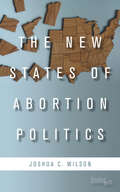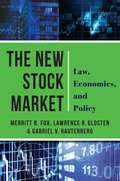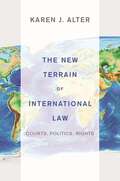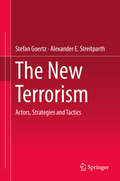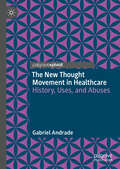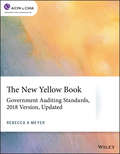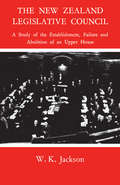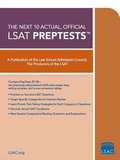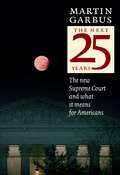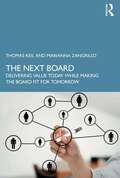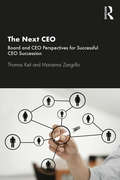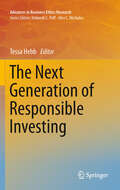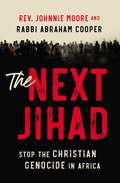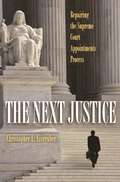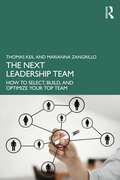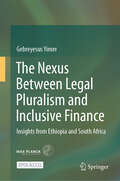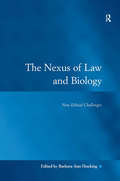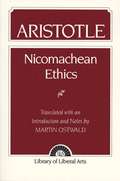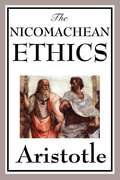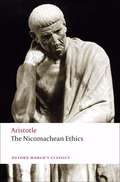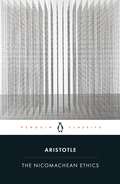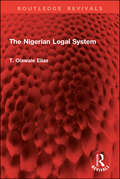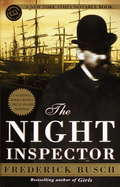- Table View
- List View
The New States of Abortion Politics
by Joshua WilsonThe 2014 Supreme Court ruling on McCullen v. Coakley striking down a Massachusetts law regulating anti-abortion activism marked the reengagement of the Supreme Court in abortion politics. A throwback to the days of clinic-front protests, the decision seemed a means to reinvigorate the old street politics of abortion. The Court's ruling also highlights the success of a decades' long effort by anti-abortion activists to transform the very politics of abortion. The New States of Abortion Politics, written by leading scholar Joshua C. Wilson, tells the story of this movement, from streets to legislative halls to courtrooms. With the end of clinic-front activism, lawyers and politicians took on the fight. Anti-abortion activists moved away from a doomed frontal assault on Roe v. Wade and adopted an incremental strategy--putting anti-abortion causes on the offensive in friendly state forums and placing reproductive rights advocates on the defense in the courts. The Supreme Court ruling on Whole Woman's Health v. Hellerstedt in 2016 makes the stakes for abortion politics higher than ever. This book elucidates how--and why.
The New Stock Market: Law, Economics, and Policy
by Merritt B. Fox Lawrence Glosten Gabriel RauterbergThe U.S. stock market has been transformed over the last twenty-five years. Once a market in which human beings traded at human speeds, it is now an electronic market pervaded by algorithmic trading, conducted at speeds nearing that of light. High-frequency traders participate in a large portion of all transactions, and a significant minority of all trade occurs on alternative trading systems known as “dark pools.” These developments have been widely criticized, but there is no consensus on the best regulatory response to these dramatic changes.The New Stock Market offers a comprehensive new look at how these markets work, how they fail, and how they should be regulated. Merritt B. Fox, Lawrence R. Glosten, and Gabriel V. Rauterberg describe stock markets’ institutions and regulatory architecture. They draw on the informational paradigm of microstructure economics to highlight the crucial role of information asymmetries and adverse selection in explaining market behavior, while examining a wide variety of developments in market practices and participants. The result is a compelling account of the stock market’s regulatory framework, fundamental institutions, and economic dynamics, combined with an assessment of its various controversies. The New Stock Market covers a wide range of issues including the practices of high-frequency traders, insider trading, manipulation, short selling, broker-dealer practices, and trading venue fees and rebates. The book illuminates both the existing regulatory structure of our equity trading markets and how we can improve it.
The New Terrain of International Law: Courts, Politics, Rights
by Karen J. AlterA compelling new look at the role of today's international courtsIn 1989, when the Cold War ended, there were six permanent international courts. Today there are more than two dozen that have collectively issued over thirty-seven thousand binding legal rulings. The New Terrain of International Law charts the developments and trends in the creation and role of international courts, and explains how the delegation of authority to international judicial institutions influences global and domestic politics.The New Terrain of International Law presents an in-depth look at the scope and powers of international courts operating around the world. Focusing on dispute resolution, enforcement, administrative review, and constitutional review, Karen Alter argues that international courts alter politics by providing legal, symbolic, and leverage resources that shift the political balance in favor of domestic and international actors who prefer policies more consistent with international law objectives. International courts name violations of the law and perhaps specify remedies. Alter explains how this limited power--the power to speak the law--translates into political influence, and she considers eighteen case studies, showing how international courts change state behavior. The case studies, spanning issue areas and regions of the world, collectively elucidate the political factors that often intervene to limit whether or not international courts are invoked and whether international judges dare to demand significant changes in state practices.
The New Terrorism: Actors, Strategies and Tactics
by Stefan Goertz Alexander E. StreitparthIn light of asymmetrical security threats in western democracies as well as in conflict regions, this timely book examines the actors, strategies and tactics of Islamist terrorism and transnational organized crime around the globe. The authors develop an interdisciplinary approach to understanding the ideologies, forms of cooperation, and technological means used in new forms of terrorism. The book starts with an empirical analysis of the new Jihadism as a global Islamist theology and strategy. Furthermore, it investigates the interaction, cooperation and fusion of transnational organized crime and Islamist terrorism and highlights new communication technologies as vital tools for terrorism. Lastly, the book provides an analysis of asymmetrical strategies and tactics used by terrorist organisations, and of low-level terrorism. As such, it will appeal to all political scientists and criminologists studying terrorism, as well as to professionals at various national and international security services.
The New Thought Movement in Healthcare: History, Uses, and Abuses
by Gabriel AndradeThis book delves into the evolution of the New Thought Movement and its pervasive influence on modern healthcare. The book begins by tracing the roots of the New Thought Movement, originating in the 19th century, emphasizing the power of the mind in healing and personal development. Over time, this philosophy morphed into the contemporary positive thinking industry, becoming a significant component of Western self-help culture. The book explores how these ideas have become a contentious point in today's culture wars, polarized between supporters who credit it for personal empowerment and critics who highlight its limitations and potential harm. Central to the discussion is an in-depth analysis of the New Thought philosophy's impact on the healthcare industry. While acknowledging the potential benefits, such as motivating patients to adopt healthier lifestyles and fostering a sense of personal agency, the book critically examines how this philosophy's emphasis on mental positivity can lead to victim-blaming. It argues that oversimplifying health issues by attributing them solely to personal mindset obscures the multifaceted reality of health, particularly the significant role of social determinants of health and systemic inequities. This critique underscores how attributing illness to insufficient positive thinking can perpetuate stigma and neglect the socio-economic and environmental factors critical for understanding and addressing health challenges. By offering a nuanced perspective, the book aims to catalyze discussions on integrating mindful optimism with a holistic acknowledgment of the complexities inherent in healthcare, striving for a more balanced and equitable approach
The New Yellow Book: Government Auditing Standards (AICPA)
by Rebecca A. MeyerIt is essential all auditors performing Yellow Book audits understand the recently revised concepts and standards of generally accepted government auditing standards (GAGAS). This book provides a baseline of information for accountants to gain an understanding of the new Yellow Book (2018 revision of Government Auditing Standards). Featuring new guidance related to independence and peer review, this book will increase your knowledge of the requirements and application guidance related to: Ethics Independence Standards for financial audits Attestation engagements Performance audits Key topics covered include: Foundation and principles for the use and application of generally accepted government auditing standards (GAGAS) General requirements for complying with the Yellow Book Ethics, independence, and professional judgment Competence and continuing professional education Quality control and peer review Standards for financial audits Standards for attestation engagements and reviews of financial statements Fieldwork standards for performance audits Reporting standards for performance audits
The New Zealand Legislative Council: A Study of the Establishment, Failure and Abolition of an Upper House
by William JacksonThe New Zealand upper house, the Legislative Council (which bore a marked resemblance to its Canadian counterpart the Federal Senate) was abolished in 1950 in an action which represents one of the most clear-cut examples of pragmatic politics in New Zealand history. It was abolished by the essentially conservative National party (fundamentally committed to the bicameral principle), while the Labour party (formally committed to abolition) at first obstructed and then merely stood on the sidelines. New Zealand thus became the only democratic country in the world without either an upper house or a formal written constitution of any consequence. The author attempts both to explain this unusual development and to assess its consequences. The generally accepted view that the Legislative Council failed in 1892 is challenged, and the causes of the decline and failure are traced back to circumstances surrounding its original establishment in 1854. Subsequently, developments since 1950 are examined in the light of abolition. The author concludes that abolition represented the right policy undertaken for the wrong reasons and that ultimately it has made a greater contribution to constitutional change in the twenty years since 1950 than the chamber itself made in the last fifty years of its existence. The New Zealand Legislative Council, an analytical historical study of an institution, throws valuable light on the strengths and weaknesses of the bicameral principle and the consequences of abolishing a second chamber of Parliament. The book should prove useful to Political Science and History courses dealing with Commonwealth Parliamentary government, comparative institutions and constitutional law. It should also appeal to all those interested in the question of bicameral representation.
The Next 10 Actual, Official LSAT PrepTests
by Law School Admission CouncilThe 10 PrepTests in this book are disclosed Law School Admission Tests (LSATs) that were administered between October 1999 and October 2002. Each test in this volume includes actual logical reasoning, reading comprehension, and analytical reasoning items followed by the writing sample, score computation table, and answer key for that test. This publication is designed to be an inexpensive way for you to gain practice and better prepare yourself for taking the LSAT.
The Next 25 Years: The New Supreme Court and What it Means for Americans
by Martin GarbusIn The Next 25 Years, renowned First Amendment lawyer Martin Garbus examines what will be the impact of the new Supreme Court on the future of our republic. Drawing on extensive knowledge of Constitutional law and legal precedents, Garbus, one of our most astute legal historians, defrocks the executive branch's grip over the judiciary as an extension of its own executive powers. He warns of the threat of an incoming "textualist" bench that wishes to roll back more than a century's worth of hard-won reforms. And he offers the first clear-eyed account of how the coming bench may imperil our way of life and endanger the liberties you may have thought were our inalienable rights.
The Next Board: Delivering Value Today while Making the Board Fit for Tomorrow
by Thomas Keil Marianna ZangrilloHardly a month goes by without news of a high‑profile corporate failure that raises the question of the role of the board. Why do boards of directors find it so difficult to steer the company and its management team? Topics such as digitalization, cybersecurity, AI, and sustainability have taken center stage, while multiple crises and the new geopolitical environment are forcing firms to operate in highly turbulent environments.Illustrated with real‑life examples from interviews with board chairs, board members, CEOs, executives, and investors, The Next Board provides unique insights on how boards can master the dual challenge of implementing the best practices of today while futureproofing an organization for the emerging challenges of tomorrow. Through the lens of the “board diamond” – purpose, people, structures and processes, leadership, and performance evaluation – this book introduces the building blocks that are central to implementing best practice. Furthermore, it provides a practical framework to configure them differently depending on the context of the company. These practices are brought to life with case studies and interviews with directors from some of the most successful firms from across the globe, including ABB, ASML, Avnet, Bertelsmann, Engie, Ericsson, IBM, Inditex, Kellogg, McKesson, Nestlé, Nokia, Novartis, Paypal, Santander, Target, and UPS.This book provides directors, board chairs, CEOs, senior executives, and C‑suite managers, who are preparing for future board assignments, with tangible advice on how to develop their boards and how to succeed as directors.
The Next CEO: Board and CEO Perspectives for Successful CEO Succession
by Thomas Keil Marianna ZangrilloEvery year, companies spend billions of dollars in board time and headhunter fees on CEO searches. In fact, by many accounts, the selection of the next CEO is the single most important task of the board of directors. Yet, despite the huge amount of time, money, and attention given to the task, many CEO changes fail, with disastrous consequences for all concerned.With so much at stake, it is natural to ask what companies and their boards can do to increase the odds of success. Illustrated with an abundance of real-life examples from interviews with CEOs, C-suite members, members of the boards, and headhunters supporting CEO searches, The Next CEO explains how boards can improve the odds of success with CEO succession by identifying clear CEO mandates and associated CEO profiles and by selecting CEOs that are fi t for purpose. It further explains how the CEOs of leading corporations effectively take charge and create results, providing a roadmap for incoming CEOs. These ideas are brought to life with case studies and interviews with well-known corporations such as ABB, Alibaba, Freudenberg, GE, Google, HNA, HP, Microsoft, Nestle, Nike, Nokia, Novartis, Roche, Sony, Tata, and Zurich Insurance. The book is invaluable practical reading for board members of medium-to-large-size fi rms involved with CEO succession, and for those preparing for their fi rst CEO position. It is also relevant to headhunters who are involved in the process of CEO succession as a working tool for them and their clients. In addition, the book will be relevant to courses on corporate governance and strategic transformation at the executive and MBA levels.
The Next Generation of Responsible Investing
by Tessa HebbIn the face of the recent financial crisis there is increased focus on long-term investment strategies. This is particularly true for institutional investors who manage our retirement savings. Simultaneously there is increased demand that financial assets be invested with an understanding of long-term environmental and social sustainability. Responsible investing provides a long-term sustainable investment strategy that values environmental, social and governance (ESG) factors in investment decision-making. Responsible Investing has always had a broad mandate. Put simply, it is a long-term sustainable investment strategy that seeks to reduce risk in investment portfolios through managing ESG issues in today's corporations. The Next Generation of Responsible Investment explores this topic in an edited volume intended for those with an interest in finance and business.
The Next Jihad: Stop the Christian Genocide in Africa
by Rev. Johnnie Moore Rabbi Abraham CooperThe Next Jihad draws from the on-the-ground experience and personal testimonials of two of the world&’s leading advocates for religious freedom and human rights—one Jewish and one Christian—as they explain what&’s happening to Christians across Africa, why it matters, and what must be done now.Although news of Christians being killed overseas hits major media outlets from time to time, the news quickly fades away while our fellow believers continue to suffer. Johnnie Moore, as he has done before, wants to awaken the church and American politicians to the daily horrors happening to Christians, focusing this time on Africa.While the world has been fixated on jihadist threats in the Middle East, terrorists from Nigeria to Kenya have had free reign to massacre on a scale far beyond that of the terrorists in Iraq and Syria. Whole villages have been razed, mothers and children have been grotesquely killed, and an unabashed effort at ethnic cleansing has been embarked upon with unrelenting resolve. Their intention is to rid Africa of its Christians, either by forced conversion to Islam or by destruction and murder.
The Next Justice: Repairing the Supreme Court Appointments Process
by Christopher L. EisgruberThe Supreme Court appointments process is broken, and the timing couldn't be worse--for liberals or conservatives. The Court is just one more solid conservative justice away from an ideological sea change--a hard-right turn on an array of issues that affect every American, from abortion to environmental protection. But neither those who look at this prospect with pleasure nor those who view it with horror will be able to make informed judgments about the next nominee to the Court--unless the appointments process is fixed now. In The Next Justice, Christopher Eisgruber boldly proposes a way to do just that. He describes a new and better manner of deliberating about who should serve on the Court--an approach that puts the burden on nominees to show that their judicial philosophies and politics are acceptable to senators and citizens alike. And he makes a new case for the virtue of judicial moderates.Long on partisan rancor and short on serious discussion, today's appointments process reveals little about what kind of judge a nominee might make. Eisgruber argues that the solution is to investigate how nominees would answer a basic question about the Court's role: When and why is it beneficial for judges to trump the decisions of elected officials? Through an examination of the politics and history of the Court, Eisgruber demonstrates that pursuing this question would reveal far more about nominees than do other tactics, such as investigating their views of specific precedents or the framers' intentions.Written with great clarity and energy, The Next Justice provides a welcome exit from the uninformative political theater of the current appointments process.
The Next Leadership Team: How to Select, Build, and Optimize Your Top Team
by Thomas Keil Marianna ZangrilloCEOs and organizational leaders are only as strong as the teams they build. And yet it is surprising how little practical advice there is for senior leaders on how to create, build, and optimize their teams. Step up The Next Leadership Team. Illustrated with real-life examples from interviews with CEOs, C-Suite members, and headhunters throughout, The Next Leadership Team explains how senior leaders can improve the performance of their leadership teams by identifying clear team approaches, associated team member profiles, and by leading that team. These ideas are brought to life with case studies and interviews with well-known corporations such as ABB, Allianz, Amazon, AXA, Best Buy, Capita, Danone, Deutsche Telekom, Ferrari, Freudenberg, Haier, Hilti, HSBC, Holcim, Huawei, Logitech, Microsoft, Nestlé, Netflix, Nokia, Nordea, Schneider Electric, Tata, Wipro, and Zurich Insurance. This book is an invaluable resource for CEOs and senior executives who need to build and develop leadership teams to drive success in the organizations they lead. It is also relevant to headhunters who are involved in the appointments of members of senior leadership teams.
The Next Victim
by Jonnie JacobsThe last time Kali spoke to her brother, he was desperate to tell her something but too drunk to get it out. Now he's dead, an apparent suicide. That is shocking, but the cops have more bad news.
The Nexus Between Legal Pluralism and Inclusive Finance: Insights from Ethiopia and South Africa
by Gebreyesus YimerThis open access book provides detailed information on informal credit markets in Africa and how various legal systems affect these markets. Laws that impose strict formalism exclude many people from the financial system. The lessons learned from the informal credit markets in Ethiopia and South Africa indicate that pluralism offers better opportunities for people to access affordable and sustainable financial services. Inclusive legal systems promote inclusive financial systems. Therefore, international development organisations, financial institutions, international financial policymakers and standard setters should embrace pluralism to foster sustainable, inclusive and equitable financial systems. Pluralism recognises local innovation and creativity, which are vital for inclusive financial systems to flourish. In developing countries, many people who have no or only limited access to the services of official financial institutions often depend on informal credit markets. National law is the most critical element in terms of determining the operations of informal credit markets, defining the boundaries between formal and informal markets, and shaping the consequences of involvement in informal credit markets. This book will interest researchers, scholars, and students in the fields of legal theory, law and society, law and anthropology, legal pluralism, law and culture, and African law. However, its relevance extends beyond academia, offering policymakers involved in inclusive finance, law and development, and financial regulation in developing countries valuable insights and perspectives to inform their decisions and strategies.
The Nexus of Law and Biology: New Ethical Challenges (Law, Justice And Power Ser.)
by Barbara Ann HockingAlthough law and science have interacted for centuries, today their interactions pose enormous challenges. These challenges are reflected in issues ranging from reproductive technology and resource conservation, to genetic technology and biological warfare. The emerging dialogue is complex and requires an ongoing re-thinking of general principles, such as expert biological evidence, which features in a wide range of legal contexts, and including medical law, torts, crime and intellectual property. Studying the many ways in which law and biology come together in many areas of contemporary life, The Nexus of Law and Biology: New Ethical Challenges explores the juridical uses of biological sciences to illuminate key issues and contemporary intersections, arguing that each of several disciplines must communicate with one another, recognizing a common ground in ethics. Featuring an impressive list of contributors, this book is an invaluable reference for legal scholars, students, practising lawyers and scientists engaged with the legal system.
The Nicomachean Ethics
by AristotleEnduringly profound treatise, whose lasting effect on Western philosophy continues to resonate. Aristotle identifies the goal of life as happiness and discusses its attainment through the contemplation of philosophic truth. Translated, with notes and introduction by Martin Ostwald.
The Nicomachean Ethics
by AristotleNicomachean Ethics focuses on the importance of habitually behaving virtuously and developing a virtuous character. Aristotle emphasized the importance of context to ethical behavior, and the ability of the virtuous person to recognize the best course of action. Aristotle argued that happiness and well being is the goal of life, and that a person's pursuit of such, rightly conceived, will result in virtuous conduct. "EVERY art and every inquiry, and similarly every action and pursuit, is thought to aim at some good; and for this reason the good has rightly been declared to be that at which all things aim." -Aristotle
The Nicomachean Ethics
by AristotleThe Author examines the nature of happiness, which he defines as a specially good kind of life. He considers the nature of practical reasoning, friendship, and the role and importance of the moral virtues in the best life.
The Nicomachean Ethics
by AristotleOne of the most important philosophical works of all time, in a new Penguin Classics translation by Adam Beresford'Right and wrong is a human thing' What does it mean to be a good person? Aristotle's famous series of lectures on ethical topics ranges over fundamental questions about good and bad character; pleasure and self-control; moral wisdom and the foundations of right and wrong; friendship and love in all their forms - all set against a rich and humane conception of what makes for a flourishing life. Adam Beresford's freshly researched translation presents many of Aristotle's key terms and idioms in standard English for the first time, and faithfully preserves the unvarnished style of the original.
The Nigerian Legal System (Routledge Revivals)
by T. Olawale EliasOriginally published in 1954 and here reissuing the second edition of 1963, The Nigerian Legal System (now with a new preface by Olusoji Elias), is an account of the history of the courts, the sources and general principles of law in Nigeria. It discusses the applications of the English doctrine of judicial precedent, the relationship of English law to customary law, and the limits within which English and Nigerian conceptions of contract, tort, crime, land tenure and personal relations operate. The author also deals with the local administration of the law, the intercourse between the bench and the bar and, not least, the future of Nigerian law.This valuable book is of use to students of African studies and lawyers who in their work have dealings with the countries of Africa. It first appeared under the title Groundwork of Nigerian Law, but the present title is a more apt description of the content. A number of textual errors have been corrected, and large sections have been entirely re-written or expanded in order to bring the book up to date.
The Night Fire: A Ballard and Bosch Thriller (Ballard and Bosch)
by Michael ConnellyLAPD Detective Renée Ballard and Harry Bosch come together again on the murder case that obsessed Bosch's mentor - but was this flame kept alive, or a secret that was meant to be snuffed out?Back when Harry Bosch was just a rookie homicide detective, he had an inspiring mentor who taught him to take the work personally and light the fire of relentlessness for every case. Now that mentor, J.J. Thompson, is dead, but after his funeral his widow hands Bosch a murder book that Thompson took with him when he left the LAPD 20 years before - the unsolved killing of a troubled young man in an alley used for drug deals.Bosch brings the murder book to Renée Ballard and asks her to help him find what about the case lit Thompson's fire all those years ago. That will be their starting point.The bond between Bosch and Ballard tightens as they become a formidable investigation team. And they soon arrive at a worrying question: Did Thompson steal the murder book to work the case in retirement, or to make sure it never got solved?
The Night Inspector
by Frederick BuschAn immensely powerful story, The Night Inspector follows the extraordinary life of William Bartholomew, a maimed veteran of the Civil War, as he returns from the battlefields to New York City, bent on reversing his fortunes. It is there he meets Jessie, a Creole prostitute who engages him in a venture that has its origins in the complexities and despair of the conflict he has left behind. He also befriends a deputy inspector of customs named Herman Melville who, largely forgotten as a writer, is condemned to live in the wake of his vanished literary success and in the turmoil of his fractured family.Delving into the depths of this country's heart and soul, Frederick Busch's stunning novel is a gripping portrait of a nation trying to heal from the ravages of war--and of one man's attempt to recapture a taste for life through the surging currents of his own emotions, ambitions, and shattered conscience.
